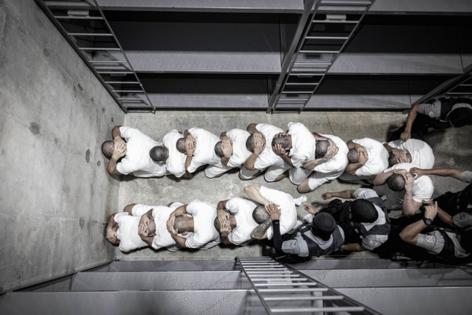US uses point system to identify, deport Venezuelans it says are Tren de Aragua members
Published in News & Features
The Trump administration is using a point system to decide which Venezuelans should be deported as suspected members of the feared Tren de Aragua gang, according to federal court documents.
The document says the system is to be used in making deportation decisions under the 1798 Alien Enemies Act against Venezuelans who are over the age of 14 who are not U.S. citizens or permanent residents.
The process, which the administration calls a “validation guide,” says suspected gang members who score eight points or higher in a scale that goes up to 81 can be deported under the Act, a 227-year old law last used during World War II that President Donald Trump invoked on March 15. The Act was used that same day to send hundreds of Venezuelans to a mega-prison in El Salvador.
The American Civil Liberties Union Immigrants’ Rights Project filed a copy of the document, the Alien Enemies Act Validation Guide, as an exhibit in a federal lawsuit in Washington, D.C.
The document appears to give discretion to Immigration and Customs Enforcement agents to deport Venezuelans who score less than eight points. However, the ICE officer must consult with a supervisor and the agencys’ Office of the Principal Legal Advisor before making the decision. If the decision is made to not validate the individual as a Tren de Aragua member and removal is deemed appropriate, ICE officers are required to initiate deportation under another federal law — the Immigration and Nationality Act, which enforces stricter measures such as increased scrutiny of potential immigrants, expedited deportations, and tougher naturalization procedures.
The Alien Enemies Act Validation Guide is broken down into five categories to validate whether someone is a member of the gang, abbreviated to TDA, using the point-scoring system:
—Judicial Outcomes and Official Documents (15 points): This category includes convictions in which the person was involved in criminal activities that advance the gang’s objectives, as well as documents like indictments or sentencing that confirm membership in TDA and describe specific TDA-related actions.
—Self-Admission (10 points): If the person verbally or in writing self-identifies as a member or associate of TDA to law enforcement, even inadvertently, such as through lawful interception of communications.
—Criminal Conduct and Information (17 points): This category includes several factors, such as participation in criminal activities with TDA members, law enforcement or intelligence reports identifying the subject as a TDA member, testimonies from victims or informants, and open-source media reports detailing the subject’s arrest or activities related to TDA. Additionally, financial transactions indicating criminal activity, such as money laundering, contribute to the score.
—Documents and Communications (25 points): This includes written or electronic communications with known TDA members, such as emails or texts, phone calls discussing TDA-related business, financial transactions linked to criminal activity, and possession of documents that suggest membership or allegiance to TDA.
—Symbolism (14 points): Scoring includes visible symbols of TDA affiliation such as tattoos, social media posts, graffiti marking TDA territory, hand signs, or clothing with TDA-related insignia observed by law enforcement, either in person or through virtual means.
Several Venezuelan families who spoke with the Miami Herald reported that their family members were targeted as members of Tren de Aragua based solely on tattoos, with no other convictions, admissions, criminal conduct or documentation linking them to the gang. One Venezuelan, who had been granted refugee status by the US. government after a 17-month background check, was deported to El Salvador despite the approval of their protection status. Another Venezuelan who had no tattoos and whose asylum claim was pending was also deported to the mega prison.
Some of the tattoos Homeland Security has linked to the Tren de Aragua gang include images of trains, AK47s, stars, the “Jumpman” logo 23 — an iconic tattoo associated with basketball star Michael Jordan when he played in the Chicago Bulls — clocks, and phrases like Real hasta la muerte — Real until death — a common slogan used by Puerto Rican rapper Anuel.
Experts who have investigated gangs in Venezuela for over a decade, before Tren de Aragua became an international organization, reject the idea that the group identifies its members through tattoos, unlike Central American gangs like Maras Salvatrucha, which are known for using tattoos as a form of identification. The experts argue that tattoos alone should not be considered valid evidence of TDA gang affiliation.
Last week, the administration asked the U.S. Supreme Court to intervene in the eforts to deport alleged Venezuelan gang members.
A brief filed by Acting Solicitor General Sarah H. Harris urged the high court to vacate a temporary restraining order issued by U.S. District Judge James E. Boasberg, which had blocked further deportation flights.
The lower court’s ruling emphasized the lack of a process allowing the accused gang members to challenge their designation under the 1798 law.
Boasberg has said that the government must prove the individuals targeted for deportation are indeed “alien enemies” before removing them from the country. Despite the ruling, the government transferred 17 more individuals, including seven Venezuelans, to El Salvador over the weekend.
©2025 Miami Herald. Visit at miamiherald.com. Distributed by Tribune Content Agency, LLC.







Comments